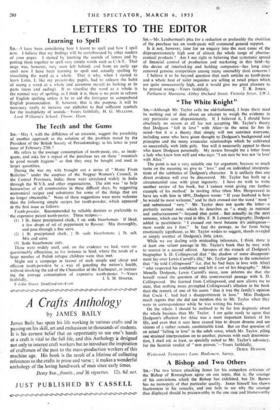The Teeth and the Gums
SIR,—May 1, with the diffidence of an amateur, suggest the possibility of another approach to the solution of the problem stated by the President of the British Society of Periodontology in his letter in your issue of February 27th ?
He refers to the average consumption of tooth-paste, etc.. as inade- quate, and asks for a repeal of the purchase tax on these " essentials to good mouth hygiene " so that they may be bought and used in larger quantities.
During the war my wife brought out a series of " Home Front Bulletins " under the auspices of the Nagpur Women's Council, in the Central Provinces, India; these were circulated widely in India through the W.V.S. and other organisations.. The aim was " to help housewives of all communities in these difficult days, by suggesting economical recipes and substitutes for some of the things that are no longer obtainable." None of these suggestions were more-welcome than the following simple recipes for tooth-powder, which appeared`_ in the first issue as follows: Tooth-powder. Recommended by reliable dentists as preferable to -the expensive patent tooth-pastes. Three recipes:— (1) 1 lb. forest precipitated chalk, 1 oz. soda bicarbonate. If liked, a few drops of oil of peppermint to flavour. - Mix thbroughly, and pass through a fine sieve.
(2) # lb. precipitated chalk, 1 lb. soda bicarbonate, 1 lb. salt. Mix and sieve.
(3) Soda bicarbonate only.
These were widely used, and, on the evidence we had, were un- questionably efficacious, as for instance in Sind, where the needs of a large amber of Polish refugee children were thus met.- Might not a campaign in favour of such simple and cheap and efficient tooth-powders be a way of guarding the nation's health, without invoking the aid of the Chancellor of the Exchequer, or increas- ing the average consumption of expensive tooth-pastes ?—Yours


































 Previous page
Previous page